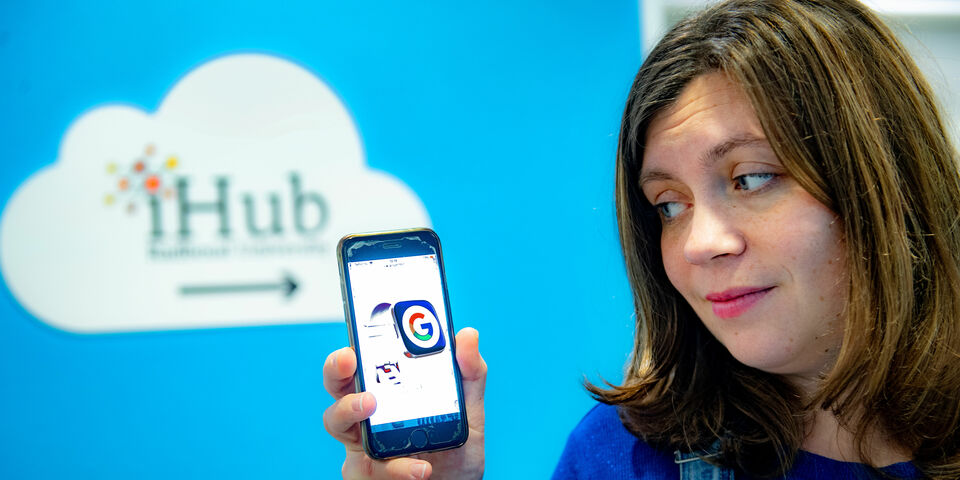Home Stretch | The drawbacks of the digital era
Heart rate and respiration, sleep patterns and menstrual cycle, hobbies and friends, sexual preference and GPS coordinates. We are giving away more and more digital information about ourselves and, unbeknownst to us, much of it is ending up in the hands of the big technology companies - Google, Facebook, Amazon, Microsoft and Apple. Technology philosopher Marjolein Lanzing finds this trend disturbing and made it the subject of her PhD thesis.
A random example: on November 1st Google paid over two billion dollars for Fitbit Inc., the maker of the eponymous activity trackers. Included in the deal was the company's database containing the health data of its product users. This means that the company behind the browser you may well be using (Chrome), that perhaps manages your email (Gmail), knows which videos you watch (YouTube) and operates your smartphone (Android), may now also know whether you are sleeping well, getting enough exercise, and whether you have a heart defect.
When you want to know more about yourself, about others and the world, the services of companies like Google can be very useful, enabling you to shape your life in a way you find meaningful. By doing this, these companies give you greater autonomy. At least, that's the idea being sold to the consumer. And while this claim may well be true, it is not what it's all about for Google, or its competitors like Facebook, Apple, Microsoft and Amazon - the Big Five as they are known. “They want to learn more about you,” says Marjolein Lanzing. Because this information is worth a fortune. “Take Tinder for example, what it's really interested in isn't love, but your personal data, which enables it to target its sales of advertisements and subscriptions.”
Decisional privacy
As a doctoral candidate in the Philosophy & Ethics group at TU/e, Lanzing studied the extent to which the perpetual chipping away at our privacy carried out by commercial digital services commercial digital services, from self-trackers like the Fitbit to dating apps like Tinder and social media like Instagram, is in fact helping to limit the user's autonomy. “As well as the familiar area of informational privacy - how we manage access to our personal information, and can check how much of that information is known to others - I also studied what is known as decisional privacy. Here, the key issue is who has permission to interfere in your decision-making, and the amount of control you have over this interference. A good example here is the scandal surrounding Cambridge Analytica in which, without their realizing it, personal information held by Facebook was used to influence voters' choices. It is terrifically important that people be protected against this, and this motivated me to dust off the concept of decisional privacy, an existing but less well known philosophical idea, and explore it in my thesis.”
Another study by Lanzing, now as a postdoc attached to Radboud University Nijmegen, focused on the behavior, particular that of young girls, displayed on Instagram. “There's a lot of surveillance going on, not in the sense of a government monitoring its citizens, but the girls on Instagram keep an extremely close eye on each other. They watch and note who shares or likes something, and why, and what you look like - before being posted, photos are shared widely for evaluation; any photo has to look sexy, but not slutty.” And besides this overt, public surveillance by peers, there's a less visible commercial surveillance going on, points out Lanzing: “Certain stereotypes are promoted through advertisements. These are aimed at users who the platform knows form a receptive audience. This has a big impact on these young people.”
Bits of Freedom
A board member of Bits of Freedom in her spare time, Lanzing raised in her thesis the question whether it is even right to treat personal data as something we trade. “We agree that some things are obviously merchandise: the bread, for example, baked by a baker. That isn't a problem. On the other hand, we generally think it is a bad idea to allow organs to be traded.” That personal data is becoming the primary commodity being traded by the big tech companies raises problems, believes this philosopher. “It gives them a great deal of power over our lives. And what's more, that power is difficult to monitor. When the perpetrator is a government, you can call them to account, but companies are harder to police. And there are plenty of cases where companies have overstepped the mark, as Cambridge Analytica did.”
She gives another example: “The app Maya, which women can use to track their menstrual cycle, has sold its information to Facebook, which can use it to better target its advertising.” This is because during pregnancy and a certain phase of their cycle, women are more susceptible to this kind of influence. And we haven't even mentioned the Big Five's cooperation with, say, health insurers and other insurance companies. “These developments carry great risks. And these are problems you cannot leave to individual citizens to solve, they need careful consideration at the level of government policy. I hope my thesis will help ensure this happens.”


Discussion